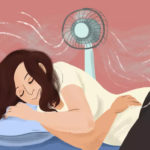Setting an earlier bedtime is an essential step towards waking up earlier in the morning. It’s important to have a consistent bedtime every night.
To wake up earlier feeling refreshed and energized, it’s crucial to establish a suitable sleep schedule for yourself.
2. Maintain a Regular Wake-Up Time
Your body thrives on routine. Having a regular wake-up time promotes high-quality sleep and a healthy sleep cycle. Therefore, aim to wake up at the same time every day.
By aligning your bedtime and wake-up time, you can easily adjust to an early morning routine without feeling tired. This will help eliminate morning grogginess.
3. Create a To-Do List
If you need motivation to wake up early and stay energized, make a list of tasks you want to accomplish in the morning.
Having a daily action plan helps increase your energy levels, reduces fatigue, and jumpstarts your productivity. Before going to bed, jot down the top three tasks you intend to complete when you wake up early the next day.
4. Exercise Regularly
Regular exercise not only improves your overall health but also enhances sleep quality. Physical activity boosts your energy levels throughout the day and reduces stress, helping you worry less about current issues. It also contributes to a better sleep pattern.
Aim to engage in at least three days of exercise per week to maintain a healthy body and ensure a good night’s sleep.

5. Read Before Bed
According to a study, reading for just six minutes before bed can reduce stress by 68%. Reading helps you relax, shift your focus away from work, and allows your brain to rest. This might be the reason for minimizing fatigue upon waking up.

6. Stay Hydrated
Many people are unknowingly dehydrated, which can lead to sluggishness and fatigue even after a full night’s sleep. Drinking plenty of water not only improves sleep quality but also boosts your overall vitality and well-being.
Whether you’re working or engaging in any activity, prioritize staying hydrated to combat fatigue, sleepiness, stress, and boredom.
7. Have an Early Dinner
Eating an early dinner benefits both your digestion and sleep. By allowing your body more time to digest food, you can focus on restorative sleep. Having an early dinner improves sleep quality and reduces the likelihood of feeling tired upon waking up.
8. Practice Bedtime Meditation
Spend about 10 minutes before bed to reflect, relax, and calm your mind. You don’t necessarily have to practice intense yoga exercises; a simple meditation routine can help reduce stress and prepare your mind for sleep.
9. Limit Alcohol Consumption
Alcohol can disrupt your sleep by affecting your body’s hormone balance and requiring extra time for alcohol metabolism. This results in less time for quality sleep, regardless of the time you go to bed.
To improve your sleep quality and wake up early without feeling tired, consider eliminating or limiting your alcohol intake.
10. Consider Melatonin Supplements
Your body naturally produces melatonin, a hormone that regulates sleep and wake cycles. If you struggle with getting a good night’s sleep, melatonin supplements can assist in regulating your sleep patterns for early morning wake-ups. It is advisable to consult your doctor if you are currently on medication for other health conditions.
11. Minimize Phone Use Before Bed
Avoid looking at your phone or engaging with distracting websites and social media apps before bed. The blue light emitted by electronic devices can disrupt your sleep cycle. For a good night’s sleep and a smoother wake-up experience, prioritize restful sleep over phone usage.
Source: VOV
Tips for Keeping Cool on a Hot Summer Day
As extreme weather patterns become increasingly common, many are struggling to find ways to cope. With temperatures in our country rising and cooling far beyond what used to be considered normal for the season, winter often feels like spring and summer can be oppressive and sweltering. How can we prepare for and manage the drastic shifts in climate?





































